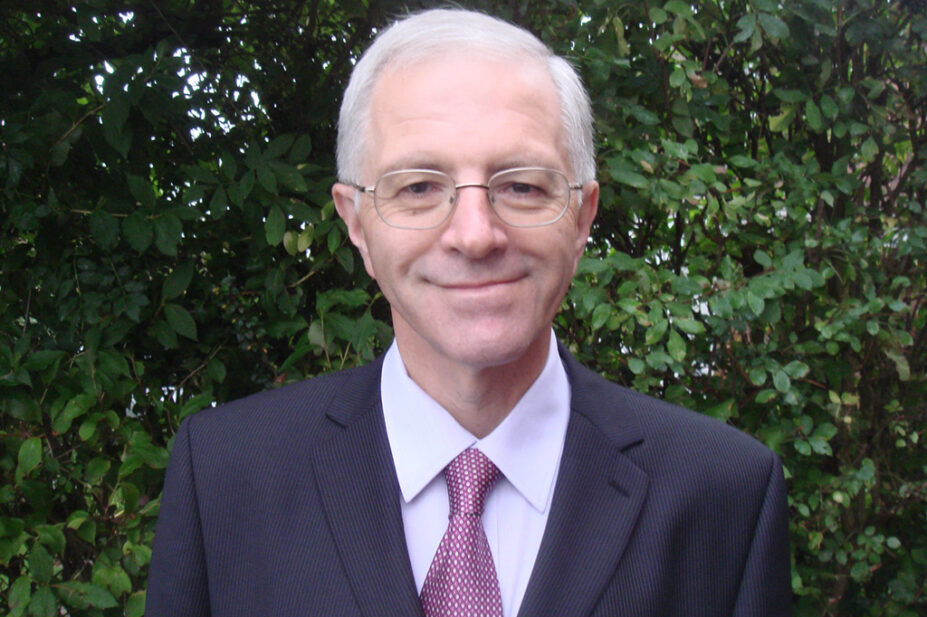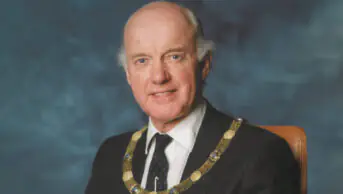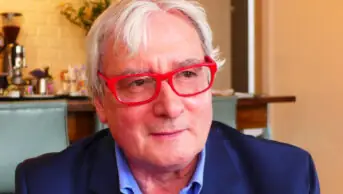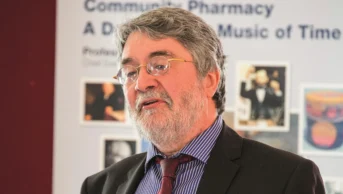
David Gerrett
David Cousins would often say he had “a pharmacy bone in this body”. Although it was said with pride, and occasionally with regret, it drove him forward during his whole life. Although retired from the pharmacy register in 2018, he was still working in 2023 with the European Society of Hospital Pharmacy on publishable material. Agree or disagree with him, he was a person you had to respect.
Having completed his pharmacy degree at the School of Pharmacy, University of London, David moved to Torquay Hospital in Devon for his pre-registration year, joined the Royal Pharmaceutical Society in 1977 and entered pharmacy as a basic grade at Barnstaple Hospital, Devon.
The promotion of pharmaceutical clinical skills in all healthcare professionals was an enduring theme in his life and he read for one of the very early clinical Master’s degrees at Cardiff University in 1981. He then promoted clinical engagement as a staff pharmacist at Orsett Hospital, Essex, and as chief pharmacist for nearly 20 years at the Derbyshire Royal Infirmary — which later merged to become the Royal Derby Hospitals NHS Trust — until 2002. He used his organisational skills to great effect. Those who knew him would agree, if you had 99 reasons for not doing something, David had 100 reasons why you should.
Many of the early clinical innovations that David introduced to hospital pharmacy resulted from close ties with the University of Chicago, Illinois. He had high standards for himself and others — and being irritatingly right on most occasions — he set up, and critically was part of, the first pharmacy on-call service in England as part of the hospital’s cardiopulmonary resuscitation team. The idea of pharmacy providing a full service extended to evolving aseptic services. He commissioned a full IV additive service, a pump and syringe driver library service and aseptic satellite pharmacies in intensive care, paediatrics, cancer care, operating theatres and palliative care/hospice settings. This was supported by a 24-hour pharmacy residency scheme. Through his entrepreneurial skills, he developed a substantial commercial aseptic dispensing business as income generation for the hospital, selling bespoke total parenteral nutrition, antibiotics, chemotherapy and other IV infusions to home-care companies and hospitals.
Further central themes in David’s life were education and research. In 1998, he was successful at viva voce for a PhD through Cardiff University and, in his position as chief pharmacist, sponsored more than 100 hospital resident pharmacists through clinical Master’s degrees at Cardiff University and the University of Derby. Through advancing education and innovative clinical service, the reputation of the hospital pharmacy grew and the excellence of its operational provision was enhanced. Accepting a post at a trust hospital was to ‘buy into’ his vision. Life was somewhat challenging for those who chose another path as he was a difficult man to argue against. It was through collaboration with the University of Derby that his vision of a practice doctorate came to fruition. It’s true to say, David steered the ship with a single rudder and a transparent, consistent direction; he was never elitist and sought to bring up the standard of the whole pharmacy provision. He worked with Mike Allwood at the University of Derby to advance the education of pharmacy technicians with diploma opportunities. With more than 100 peer-reviewed publications, and as a University of Derby visiting professor, it was his early patient safety articles with David Upton that fired his interest in medication patient safety.
In 2002, David moved to his ‘dream job’ in patient safety at the National Patient Safety Agency. His level of his commitment was demonstrated as he travelled from Derby to London for five years, five days a week, waking up at 5:00, riding his scooter down to Derby station, catching the 6:30 train to work and finally returning home at 19:00. However, long hours meant great achievement. He developed and implemented the medication and medical devices section of the NHS National Reporting and Learning System, and researched and published more than 50 patient safety alerts and other national guidelines. The main ones among these were directives to minimise preventable deaths that he knew of from his hospital experiences, including: the safer use of concentrated potassium chloride injection, warfarin and anticoagulants; reducing harms from injectable medicines; how to minimise wrong route errors, including oral liquid medicines; IV vincristine; IV bupivacaine; reducing harm from omitted and delayed medicines; and a series of Design for Safety booklets, providing guidance on labelling and packaging of medicines and design of infusion devices. Untold numbers of patients, whom David never knew, have reason to be grateful for the work he did on medication safety. He is likely to have touched more lives than he could have imagined.
David moved on from patient safety in 2014 and spent four years working locally at Healthcare at Home, a clinical provider of medicine-based healthcare in the home.
As a professional, his contribution to pharmacy was recognised with four lifetime achievement awards by three UK professional pharmacy organisations and an international medication safety institute.
Equally important in David’s life was his family and his love of music. He was the originator, organiser and leader of the ‘silver sax’ group, which grew from a 4 to an 11-piece band over 20 years. His spare time was spent sailing, on canal holidays and riding a succession of scooters and motorbikes — ultimately a Harley Davidson.
For those who were fortunate enough to know David Cousins, he was a unique and a truly dedicated man of his word, who helped others succeed in their careers and personal lives. It was a pleasure and a privilege to call him a friend. After a short illness, he died peacefully at his home with his wife Trina and sons Christopher (David) and Daniel (Adam) present, and in true ‘DC’ fashion, without any medication.
David Gerrett, Bruce Warner and Trina Cousins
5 comments
You must be logged in to post a comment.
You may also be interested in

Philip Leon Marshall Davies (1938–2026)

Bill Scott OBE (1949–2025)

I was very sad to read of David Cousins death. I first met him around 1980 when he came to work for me as a ‘Saturday pharmacist’ in the pharmacy I then ran on Canvey Island. He was a careful, conscientious pharmacist, someone with whom it was a pleasure to work. However he soon moved on, as did I and the next time I heard of him was in 1990 when I went at Orsett Hospital, where he had almost mythical status among those who had worked with him!
We watched his career with interest, and it was no surprise that he achieved the heights he did.
My deepest sympathies go to his wife and family.
Tribute to David Cousin: A Luminary in Pharmacy and Medicine Safety
It is with profound sadness that I learned of the passing of David Cousin, a figure of unparalleled stature within the world of pharmacy strategy and an extraordinary human being. As the president of the Royal Pharmaceutical Society of Great Britain (RPSGB) during our acquaintance, I was immersed in the mission to make Britain the safest place to take medicines. Our paths crossed during this pivotal time, and a shared fervour for medicine safety solidified our professional and personal bond.
Our frequent interactions were an exchange of passion and knowledge, from which I gleaned invaluable insights. David's presence was highly influential and impactful, marked by his steadfast leadership both nationally and internationally.
A memory that stands out vividly is of a gathering of global experts on medicine safety in Chicago. David's reputation preceded him there as well, with international colleagues expressing their immense respect and admiration for him. His natural wit and kindness added a distinctive charm to his personality, making him a cherished figure among peers and friends.
The pharmacy community, as well as his beloved family, has suffered a great loss. But David's legacy, deeply rooted in the realm of medicine safety, continues to thrive, influencing current and future generations in the field.
My heartfelt condolences extend to his wife, children, and extended family. David Cousin will be profoundly missed, yet his influence and memory will undeniably persist.
It was with great sadness that I learned of the death of David Cousins, a pharmacist whose legacy will live on for years to come.
Our paths crossed often during his career. I was invited to be the external assessor on the interview panel when he was appointed Chief Pharmacist at Derby Royal Infirmary and many years later, I chaired the interview panel when he was appointed to the National Patient Safety Agency. History tells us that the right person was appointed on both occasions. His contribution to the advancement of hospital pharmacy practice and education and to the improvement in patient safety, through the development of policies and procedures, are recognised across the world.
I offer my deepest sympathy to his wife and family.
I was saddened to hear of David's death, one of the outstanding hospital pharmacists of his generation and a giant for others to emulate.
David was an innovator, a firm believer in evidence as a basis for service development, a strong advocate for patient care at the centre of things, and a thoroughly nice guy…
So much of what others were able to achieve was built upon the foundations provided by David.
I will miss him and his common sense approach.
I offer my deepest sympathy to his family and hope that the profession will continue to benefit from his leadership and example.
I too was someone who benefitted enormously from David's influence and support through my early years as a resident pharmacist at Derbyshire Royal Infirmary (THE residency programme), clinical diploma and as a clinical pharmacist. I followed in David's footsteps with input to the Pharmacy Academic Practice Unit at University of Derby, and subsequently carrying the baton, as Chief Pharmacist at Derby Hospitals NHS Foundation Trust until 2013. As I reach the end of my own career, I am indebted to him for his wise counsel and support - a true mentor, a true gentleman. With my best thoughts for his family and friends.